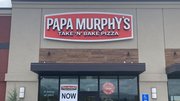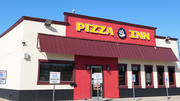News
Bounce back ... to your bottom line
Free and nearly automated NSF check recovery services make check acceptance much safer, and even profitable, for pizza operators.
February 15, 2005
Bad checks are like grapes to Bob Ogle.
"They come in bunches and clusters," said Ogle, a Breadeaux Pizza franchisee in League City, Texas. "I'll get none for a while and then I'll get three or four in a row."
Unlike grapes, however, bad checks are never sweet. But with the growing presence of check recovery services, they don't always have to be sour, either.
According to both users and providers of computerized recovery services, merchants are able to reclaim as much as 80 percent of funds that would have been lost on bad checks. Services that attack the problem with the combined weapons of computer databases, access to financial networks and the Internet return not only the full face value of a bad check to the operator, but a portion of the state fee (the penalty) assessed to the person who wrote it.
Better yet, those services typically are free.
Saeed Keshtgar, a six-unit Round Table Pizza franchisee in central California, can't imagine running his company without a recovery service's help. He said customers are sending him bad checks more than ever.
"I've been in business for 25 years, and over the last 10 years I've seen it getting worse," said Keshtgar. "Both the number of checks coming back and the amount of the checks are going up. It's not getting better."
Apparently
|
But operators claim recovery rates are vastly improved.
"We get a good percentage of them back," Keshtgar said. "And the ones we get back come with more than the face value. If I have $1,000 dollars in bad checks from all six stores, I can get back $1,200."
Too good to be true?
For decades, many operators viewed bad checks as a bitter pill they had to swallow if they were going to sell pizza. As the most common alternative to cash, most had to accept checks, and that meant somebody at some time was going to bounce a bad one their way.
The time required to hunt down the offender — phone calls to customers, their banks and oftentimes a collection service — typically didn't warrant the effort because the amount to be gained was, more often than not, low. The majority of customers weren't sticking it to the operator anyway, so why worry about the few bad ones, right?
The rules of the game changed a few years ago, though, when electronic collection services were allowed to claim a share of the penalties assessed to the bad check writer. Not only did these services have the technical expertise to access and debit the offender's account, they could make a profit by claiming all or some of the state fee — while returning the full face value of the check to the bilked operator.
No more pizza operators playing the check recovery game, right?
"We've got a long way to go before that's a reality," said Richard McShirley, business development manager for Justchex in Oxnard, Calif. "There are lot of people still out there who either think they can do this just as well themselves, or they don't believe it's really free."
According to Charlie Pilkington, a partner in NorthStar Technologies, larger pizza companies are the early adapters to modern recovery services, not independents. A typical client of his is Mazzio's Pizza, a Tulsa, Okla.-based chain of 188 units.
"So many smaller (operators) have tried to do this in house, but they're just not equipped to do it quickly," said Pilkington, whose recovery service is also located in Tulsa. "These are guys who are busy and don't have time to call and clear checks."
Breadeaux's Ogle understands their situation. Not only is he busy, he's admittedly not computer savvy. He also likes to make one personal contact with the customer to resolve the situation before sending the check out for collection. Sometimes, he said, the customer simply wrote the bad check by mistake.
If the customer doesn't make good, he then moves to the Internet and starts the electronic collection process.
"It's really very simple to do, even for me," he said. "The Web site gives you a menu, you enter the routing code, then bank account number, the customer's name, the check number, the amount of the check, and then you send it. It's very quick."
With six stores, Keshtgar said that's not an option for him anymore.
"I wouldn't be able to do it myself anyway, so I had my secretary do it, and she used to sit there for hours trying to get payment," he said. He could have his staff do the re-presentment via his recovery service's Web site, but he chooses instead to have it fully automated. "It really only takes seconds to enter, but it only costs $9.99 a month to have it done. It's worth it."
Modern twist
Not only are many check recovery services good, fast and free, some are configured to verify checks before they're accepted by the operator. For pizza operations whose POS systems are linked to broadband Internet connections, both NorthStar and Justchex have instant Web-based verification. At light speed, their databases can cross-reference names, addresses, phone numbers and check numbers to see whether a patron's check is acceptable. That information also can be stored on the pizza unit's POS, which allows operators to know instantly whether the customer's payment past is a checkered one.
For those who don't have broadband, verification units that are attached to a standard dial-up phone line are available. If the customer tells the order taker they'll be paying with a check, McShirley said the staffer asks for the routing number and the account number. Fifteen seconds later, it's verified or declined.
"If anything, this is a great way to avoid serving repeat offenders," he said. "We've found that those people are the biggest source of bad checks written to pizzerias."
Justchex has also moved verification into delivery drivers' hands. Using SMS (simple message system) devices, such as cell phones or other text message units, a driver can verify or decline a customer's check at the door.
Round Table's Keshgtar said getting burned in the field is common, but that it can happen in the store, too, if employees aren't careful.
"If a customer comes into a store and pays by check, and the employee doesn't check their I.D., we're probably in trouble," he said. "They don't always do it like they're supposed to."
 ChatGPT
ChatGPT Grok
Grok Perplexity
Perplexity Claude
Claude









